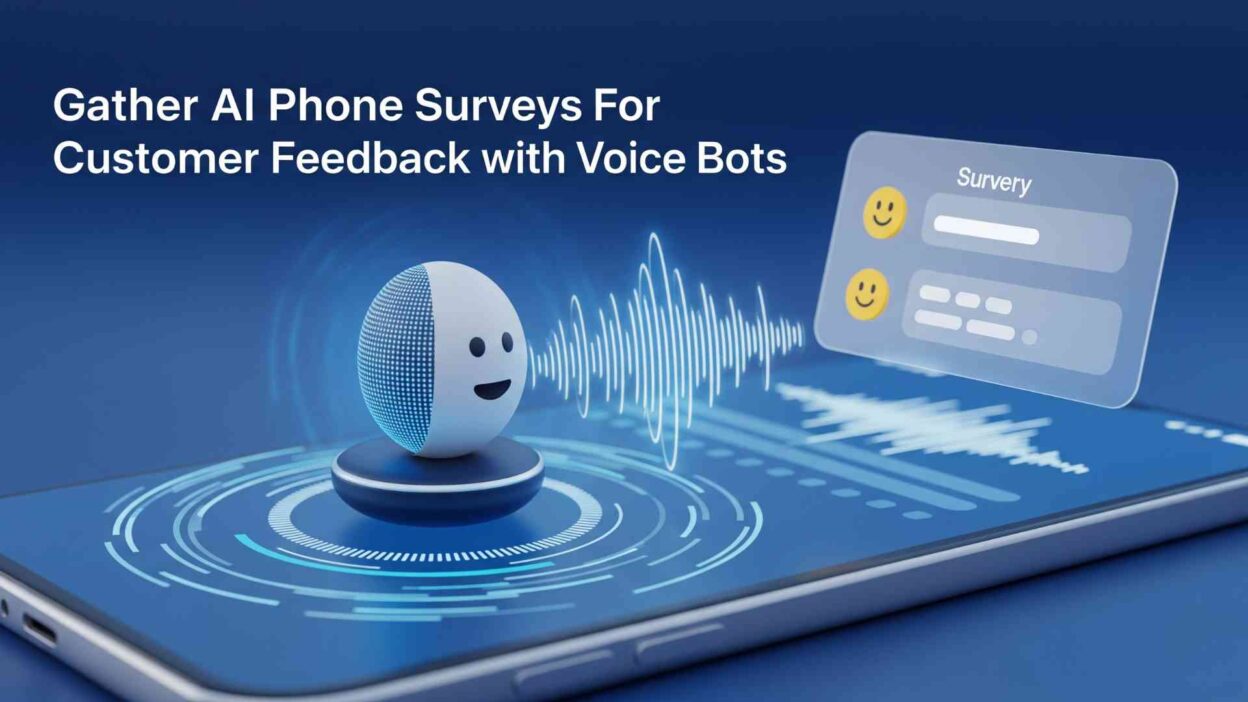TL;DR AI phone surveys for customer feedback drive business success. Traditional survey methods often fail to capture genuine responses. Phone surveys face challenges with low response rates and high costs.
Table of Contents
AI technology transforms how businesses collect customer opinions. Voice bots make phone surveys more efficient and cost-effective. Companies can now gather feedback at scale without human intervention.
How AI Phone Surveys for Customer Feedback Work
AI phone surveys for customer feedback use advanced voice recognition technology. The system calls customers at optimal times. Voice bots ask pre-programmed questions in a natural conversation style.
Customers respond using their voice or phone keypad. The AI understands various accents and speech patterns. Natural language processing converts responses into actionable data.
The entire process happens automatically. No human agents are required for basic survey calls. This reduces operational costs significantly.
Benefits of Automated Voice Survey Systems
Cost Reduction
Traditional phone surveys require trained human agents. Labor costs make large-scale surveys expensive. AI eliminates these personnel expenses.
Voice bots work 24/7 without breaks or overtime pay. One AI system handles hundreds of calls simultaneously. This scalability reduces per-survey costs dramatically.
Improved Response Rates
AI voice bots sound natural and friendly. Customers feel more comfortable sharing honest opinions. The conversational approach increases participation rates.
Timing optimization ensures calls reach customers when convenient. AI learns from past interactions to improve engagement. Smart scheduling boosts survey completion rates.
Data Quality Enhancement
Human agents sometimes influence responses unintentionally. AI maintains consistent questioning across all calls. This eliminates interviewer bias from survey results.
Voice bots capture responses immediately in digital format. Data entry errors become impossible. Real-time analysis provides instant insights.
Key Features of AI Phone Surveys for Customer Feedback
Natural Language Processing
Modern AI understands customer responses accurately. The technology interprets emotions and sentiment in voice. Complex answers get categorized automatically.
Voice bots adapt their questioning based on previous responses. Dynamic conversation flows feel more natural. Customers engage more deeply with personalized interactions.
Multi-Language Support
AI systems support multiple languages and dialects. Global businesses can survey diverse customer bases. Language barriers no longer limit feedback collection.
Integration Capabilities
AI phone survey platforms connect with existing CRM systems. Customer data syncs automatically across platforms. Survey results update customer profiles in real-time.
Implementation Best Practices
Question Design
Keep survey questions short and clear. Avoid complex or technical language. Test questions with small groups before full deployment.
Design conversation flows that feel natural. Allow customers to clarify or expand their responses. Build in confirmation steps for important answers.
Timing Strategy
Schedule calls during appropriate hours for your customer base. Avoid meal times and early morning calls. Respect time zone differences for global customers.
Monitor response rates by calling time. Adjust scheduling based on performance data. Optimal timing improves survey completion rates.
Compliance Considerations
Follow telephone marketing regulations in your region. Obtain proper consent before making survey calls. Maintain do-not-call list compliance.
Provide easy opt-out options during calls. Respect customer preferences about contact frequency. Store consent records for audit purposes.
Measuring Success and ROI
Response Rate Metrics
Track completion rates across different customer segments. Monitor drop-off points in survey conversations. Identify patterns that affect participation.
Compare AI survey performance to traditional methods. Measure improvement in data collection efficiency. Calculate cost savings per completed survey.
Data Quality Assessment
Evaluate response accuracy and completeness. Check for inconsistencies in customer feedback patterns. Validate AI interpretation of voice responses.
Analyze sentiment trends over time. Identify recurring themes in customer comments. Use insights to drive business improvements.
Common Challenges and Solutions
Technology Limitations
Voice recognition accuracy varies with background noise. Implement noise filtering and audio enhancement. Provide alternative input methods like keypad responses.
Some customers prefer human interaction. Offer escalation options to live agents when needed. Balance automation with personal touch requirements.
Customer Acceptance
Some people hesitate to engage with AI systems. Use clear introductions explaining the survey purpose. Emphasize the value of customer feedback to the business.
Train AI to handle confused or reluctant respondents. Provide patient explanations and gentle encouragement. Respect customers who prefer not to participate.
Future Trends in AI Survey Technology
Advanced Emotion Recognition
Next-generation AI will detect subtle emotional cues in voice. This capability provides deeper insights into customer satisfaction. Emotion analysis reveals unspoken concerns and preferences.
Predictive Analytics Integration
AI systems will predict which customers need follow-up surveys. Proactive feedback collection prevents issues before they escalate. Predictive models identify at-risk customer relationships.
Conversational AI Improvements
Future voice bots will handle more complex conversations. Natural dialogue capabilities will continue advancing. Customers may forget they’re speaking with AI systems.
Getting Started with AI Phone Surveys
Platform Selection
Research available AI survey platforms thoroughly. Compare features, pricing, and integration options. Choose systems that match your technical requirements.
Consider scalability for future growth needs. Evaluate customer support and training resources. Test platforms with pilot programs before full implementation.
Pilot Program Planning
Start with small customer segments for initial testing. Use simple survey topics to validate system performance. Gather feedback from both customers and internal teams.
Monitor technical performance during pilot phases. Adjust conversation scripts based on real interactions. Refine processes before scaling to larger audiences.
Team Training
Educate staff about AI survey capabilities and limitations. Provide training on data interpretation and analysis. Establish workflows for handling survey insights.
Create standard procedures for system maintenance and updates. Develop protocols for escalating technical issues. Ensure team readiness for full deployment.
Read More: Why AI Calls Are The Future Of Phone-Based Customer Support
Conclusion

AI phone surveys turn customer feedback collection for modern businesses. These systems provide cost-effective solutions for gathering valuable customer insights. Voice bots deliver consistent, unbiased survey experiences at scale.
Smart implementation of AI survey technology improves response rates and data quality. Businesses gain a deeper understanding of customer needs and preferences. The investment in automated feedback systems pays dividends through better customer relationships. Companies ready to modernize their feedback collection should explore AI phone survey options. The technology offers compelling advantages over traditional survey methods. Early adopters gain competitive advantages through superior customer intelligence.






[…] Read More: Gather AI Phone Surveys For Customer Feedback With Voice Bots […]
[…] Read More: Gather AI Phone Surveys For Customer Feedback With AI Voice Bots […]
[…] Read More: Gather AI Phone Surveys For Customer Feedback With Voice Bots […]